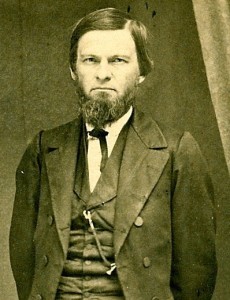John A. Broadus: 1889-1895
John Broadus, Southern’s second president, was born on January 24, 1827 in Culpeper County, Virginia. After undergraduate and graduate work at the University of Virginia, he joined the university’s faculty as an assistant professor of classics. There, he displayed unusual facility in his post. He served simultaneously as pastor of the Charlottesville Baptist Church. In this period, Broadus won the heart of Maria Harrison, daughter of renowned classics professor Gessner Harrison. Married on November 18, 1850, the Broaduses had three daughters (Eliza, Annie, and Maria) together before Maria passed away on October 21, 1857 at twenty-six years of age. On January 4, 1859, Broadus married Charlotte Eleanor Sinclair, who gave birth to several additional children.
The 1858 Education Convention elected Broadus to the seminary’s first faculty. Broadus declined the position because he had close ties to school and family in Charlottesville. For months, Boyce and Manly doggedly urged him to reconsider. After much thought, and not a little anguish, Broadus accepted. From the time he began teaching, Broadus showed a lifelong affection for instructing and mentoring students. Prior to the seminary’s closing in the Civil War period, Broadus drew a single student to his homiletics class. Rather than canceling the class, Broadus lectured to his lone pupil week after week, honing the content that later became the book The Preparation and Delivery of Sermons. The text’s durability was remarkable. Over half a century later, several seminaries used it in homiletics classes.
When Southern suspended courses in 1862, Broadus served as a chaplain to Confederate soldiers. He returned to Southern at the war’s end and resumed his teaching post. His talents gained renown. Over Broadus’s career, the University of Chicago, Vassar University, Brown University, Georgetown College, and Crozer Theological Seminary each wooed the professor as a potential president. Large and wealthy churches invited him to be their pastor. Broadus declined these overtures. The greatest need and his greatest influence were at the seminary he loved. In 1889 trustees elected Broadus president of the seminary to succeed Boyce. He guided the school for six peaceful years.
Broadus contributed much to the fields in which he taught. In addition to his landmark text on preaching, the scholar labored over his Commentary on the Gospel of Matthew for twenty years before publishing it. With such depth of thought, he excelled at preaching. University of Chicago professor W. C. Wilkinson once remarked of Broadus that he had “every natural endowment, every acquired accomplishment to have become, had he been only a preacher, a preacher hardly second to any in the world.” (1) By his plain exposition and conversational delivery, Broadus changed the character of SBC preaching, a shift seen in the current day.
Broadus’s life is notable on a variety of fronts. While a pastor in Virginia, Broadus baptized Lottie Moon, who became Southern Baptist’s most famous overseas missionary. In the Civil War, Broadus preached before Confederate general Robert E. Lee and other Confederate generals, earning a standing invitation from Lee to preach for him. J. D. Rockefeller went further than Lee—he offered Broadus a hefty salary to become his pastor in New York City, an offer Broadus turned down. In 1886, on the 250th anniversary of Harvard University, the school conferred an honorary degree on Broadus due to his national academic reputation. In 1889, Yale University invited the professor to New Haven to deliver the Lyman Beecher Lectures on preaching. Broadus was the only Southern Baptist to address the Ivy League school in a series of talks. Together with Basil Manly, Jr., he founded the monthly Sunday School newspaper, Kind Words in 1866, a title that was eventually adopted by the Southern Baptist Convention’s Home Mission Board.
As a preacher, professor, and leader, Broadus looms large in Southern’s history and in the history of the SBC. He was an active churchman at Louisville’s Walnut Street Baptist Church. Broadus passed away on March 16, 1895.
(1) William Mueller, A History of Southern Baptist Theological Seminary, 67.
Source: William Mueller, A History of Southern Baptist Theological Seminary, Nashville, TN: Broadman, 1959.
Any historical record of the founders of the Southern Baptist Convention, and The Southern Baptist Theological Seminary, is incomplete without an honest telling of their complicity in American slavery and racism. For more on that story, read here.

